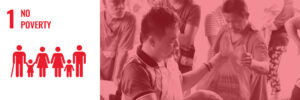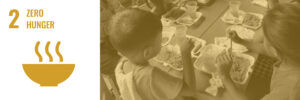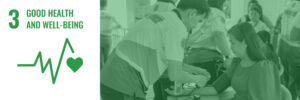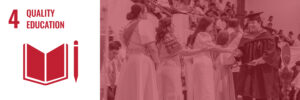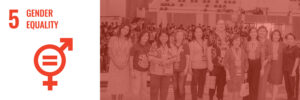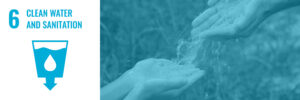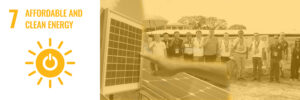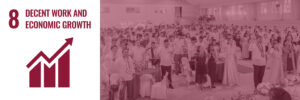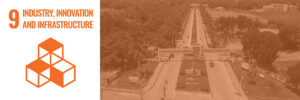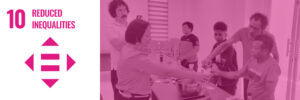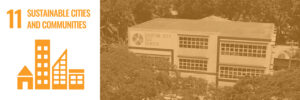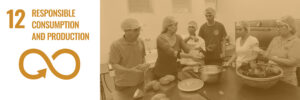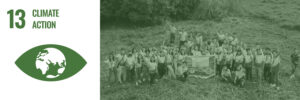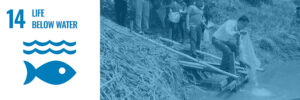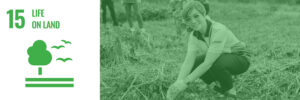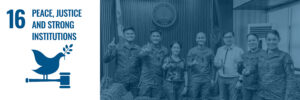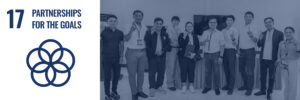2023 – Research | SDG 4 – Quality Education
Technical Research Category
Higher Education Research Category
Teaching Career Readiness and Licensure Examination for Teachers’ Performance of K to 12 Teacher Education Graduates
Proponents: Dr. Marina D. Acerit, Dr. Jennelyn L. Raymundo, Randy P. Acoba
Abstract
This study aimed to evaluate the performance and readiness of teacher education graduates in relation to their Licensure Examination for Teachers (LET) scores, focusing on a sample predominantly consisting of female graduates from various programs located in the Philippines. The findings revealed that graduates from the Bachelor of Secondary Education (BSED) program outperformed their peers in General and Professional Education sections of the LET, while those from the Bachelor of Physical Education (BPED) and Bachelor of Technology and Livelihood Education (BTLED) slightly excelled in specialization. Overall, graduates demonstrated exceptional proficiency across critical domains such as content knowledge, pedagogical methodologies, and learning environment management. Notably, there were no significant gender differences in LET performance, which suggests that teaching methodologies and candidate preparation should be the focus for improvement rather than gender-specific initiatives. However, male graduates exhibited heightened proficiency in utilizing Information and Communication Technology (ICT) and managing classroom dynamics. Therefore, tailored interventions for female graduates, particularly in classroom management, are recommended. Lastly, a significant correlation was found between teaching readiness and LET performance, particularly in curriculum planning.
Learning and Study Skills and Academic Performance of the English Major Students in the Post-Pandemic
Proponent: Robin V. Guillermo, Ph.D.
Abstract
This study sought to determine the profile and learning and studying skills of the English pre-service teachers in the post pandemic in Isabela State University Echague Campus in the School Year 2022-2023 and which of these could predict their academic performance. The respondents were mostly female, over twenty years old, used a cellphone, connected through mobile data, and had good Internet connection. Their academic performance was between fairly satisfactory and good. Using an adopted survey questionnaire, it was found out that the students always employed collaboration and often employed creativity, critical thinking and communication skills. They often used all the categories of studying skills such as reading textbooks, taking notes, studying, memorizing, preparing for tests and managing their time. Using stepwise linear regression, only year level was found to predict their academic performance. The study concluded that the students have already adapted to the academic challenges in the post-pandemic among others. Also, it recommends that the students should continue the enhancement of their learning and studying skills among others.
Predictors of Education Graduates’ Performance in the Licensure Examination for Teachers (LET) in Isabela State University Echague Campus
Proponent: Sheryl Irene E. Manaligod, Ph.D.
Abstract
This study aimed to identify variables that best predict the performance of BSEd graduates in the Licensure Examination of Teachers. Specifically, it sought to describe the profile of the BSEd graduates in terms of specialization/major, monthly income, college admission test scores, academic performance, and review center attendance, as well as their LET performance. Additionally, this study aimed to develop a linear combination that can best predict LET performance. A descriptive correlational method of research was employed.
The findings revealed that the respondents comprised a diverse group of students with varied academic specializations and financial backgrounds. Many students face economic challenges and perform at average academic levels, with only a small percentage excelling. However, the high attendance at review centers demonstrates their commitment to improving their educational outcomes. While the majority of BSEd graduates perform at an average level in the LET, a significant portion of students with low or failing scores, highlighting areas for improvement. Moreover, the respondents’ field of specialization and academic performance were found to be significant predictors of LET performance.
It is recommended that future researchers may explore other potential predictors of success in LET performance beyond academic performance and specialization or major. Investigating factors such as motivation, teaching methods, classroom environment, and extra-curricular activities could provide a more comprehensive understanding of what influences success in LET. Additionally, expanding the sample size might yield more generalizable results.
Time Series Analysis and Forecast of School Performance in the Licensure Examination for Teachers in Isabela State University Echague Campus
Proponent: Randy P. Acoba
Abstract
The performance in the Licensure Examination for Teachers (LET) is regarded as a key performance indicator for Teacher Education Institutions (TEls) to establish their brand of quality tertiary education. Not only does a performance in the board examination plays a big role in quality assurance, but it also serves as a basis for the TEls to craft policies and programs that will further enhance their instruction. This study focused on the time-series analysis of LET performance of Isabela State University-Echague Campus from 2007 to 2022 using the Autoregressive Integrated Moving Average (ARIMA) model. Results showed that the Bachelor of Secondary Education graduates of ISU-Echague consistently outperformed the national passing rate since 2011, except in 2022 during which there were only 3 first takers who took the LET. Also, ARIMA (1, 1, 2) model effectively forecasted the BSE graduates’ performance in March 2023, September 2023, and in March 2024 LET. In addition, ARIMA (1, 1, 2) model effectively forecasted the LET national passing rate in March 2023, September 2023, and in March 2024. Both models show a Mean Absolute Percentage Errors of 1.80% and 1.10%, respectively. While the performance of BSE graduates in LET is consistently above the national passing rate based on the latest three-period board examinations, it is recommended to conduct other studies such as determining other factors that may be attributed to this noteworthy performance.
Learning and Study Skills and Academic Performance of the Filipino Major Students in the Post-Pandemic
Proponent: Dayson C. Lata, Ph.D.
Abstract
This study investigated the learning and study skills of Filipino major pre-service teachers at Isabela State University-Echague Campus during the post-pandemic era (2023-2024). A descriptive correlational design explored the relationship between student profiles, learning skills, study skills, and academic performance. The majority of respondents were female (89.1%) in the 20-21 age range with average internet connectivity, primarily relying on WiFi. The study revealed strong collaborative, critical thinking, creativity, and communication skills among Filipino major students, demonstrating their dedication to academic success. Areas for improvement included body language, confidence in generating innovative ideas, and time management. Statistical analysis showed a significant impact of internet connectivity, sex, and study habits on academic performance. These findings highlight the importance of maintaining stable internet access and further strengthening existing learning skills of Filipino major students. Tailored workshops and collaborative learning activities could address identified areas for improvement and enhance their overall learning experience and academic success.
Developing Students’ Entrepreneurial Competencies among Undergraduate Students: The Case of Isabela State University – Echague Campus
Proponent: Jayson G. Gollayan
Abstract
Entrepreneurship education (EE) has become an essential tool for equipping students with the necessary skills, mindset, and confidence to pursue entrepreneurial ventures and contribute to economic development. This study aims to assess the impact of compulsory entrepreneurship education on the development of personal entrepreneurial competencies (PECs) among undergraduate students at Isabela State University (ISU). The research focuses on comparing the entrepreneurial competencies of students from business and non- business clusters. Using the PECs framework, a quantitative survey was conducted across ten competency domains: opportunity seeking, persistence, commitment to work contract, demand for quality and efficiency, risk-taking, goal setting. information seeking, systematic planning and monitoring, persuasion and networking, and self-confidence. A 5-point Likert scale was used to measure the extent to which students exhibit these competencies. Statistical tools such as t-tests were employed to determine significant differences between the two groups. Results revealed that while business students scored significantly higher in opportunity seeking, there were no substantial differences in the other nine competencies. Both business and non-business students demonstrated strong entrepreneurial competencies overall. The findings suggest that ISU’s entrepreneurship education program effectively
cultivates entrepreneurial competencies across disciplines. An action plan is proposed to enhance the entrepreneurship curriculum further, ensuring that students from all fields of study develop the necessary entrepreneurial skills to thrive in a competitive economic environment.
Teachers’ Morale and Organization Justice at the College of Education, ISUE
Proponent: Rodel B. Guzman
Abstract
The entire educational system of the Philippines is under revolutionary development because of the EDCOM 2 report declaring crisis in education in the country. Understanding the pivotal role of Teacher Education Institutions (TEI) in the country’s education landscape it is therefore imperative to unravel factors that affect faculty of these institutions. This study was conducted to assessed the organizational justice, leadership practices and work beliefs of faculty at the College of Education with the aim of offering insights for policy development. It was revealed in the study that generally there is a justifiable and fair distribution of workloads among members of the workforce in the college and that their salaries commensurate to their responsibility. However, work schedule and job decision by the leaders are seen to be an issue among the faculty. Statistically, male faculty have higher observation on issues related workload distributions while faculty holding higher level of designations are more positive about the level of organizational justice in the college than their counterparts.
Social Research Category
Examining Teachers’ Sense of Efficacy at Isabela State University – Echague Campus
Proponent: Kristian Paul M. Lazo, EdD
Abstract
This study examines the self-efficacy of teachers at Isabela State University, Echague Campus, focusing on their instructional, motivational, and classroom management abilities. Utilizing a quantitative descriptive correlational design, data were gathered from 36 faculty members using the Teachers’ Sense of Efficacy Scale (TSES). Results indicated that teachers exhibit high levels of efficacy across all domains, particularly in adapting instructional strategies and managing classroom behavior. However, challenges were noted in addressing the needs of low-performing and difficult students. Demographic factors such as age, sex, and years of service showed minimal influence on self-efficacy, with only minor correlations observed. Overall, the findings suggest that while ISU teachers are confident and effective, further professional development could enhance their ability to engage and manage challenging students. The study highlights the importance of self-efficacy in fostering a positive learning environment and improving student outcomes.
Closer Look to Explore the Knowledge, Skills & Attitude (KSA) on the Faculty Community Engagement of the College of Business, Accountancy & Public Administration (CBAPA) Isabela State University (ISU) Echague, Isabela
Study 1: Knowledge of Community Service
Proponents: Amie G. Bala, MBA, Ralliegh F. Vizcarra, RMT, Ph.D., DBA, DPA
Abstract
This study develops a framework for assessing community service knowledge among faculty extensionists in the College of Business, Accountancy & Public Administration (CBAPA) at Isabela State University. Recognizing the critical role of community service in higher education, the research identifies gaps in faculty engagement and effectiveness, exacerbated by a disconnect between theoretical knowledge and practical application. The study employs a mixed-methods approach to explore the current level of knowledge among faculty regarding community needs, environmental awareness, and effective extension practices. Key objectives include defining essential knowledge components and assessing personal perspectives on community service initiatives. Findings reveal that faculty often struggle with understanding local cultural dynamics, which impedes their effectiveness. The study recommends targeted training programs and structural support to enhance faculty engagement in community service. The developed framework aims to foster sustained community partnerships, ensuring faculty are equipped to meet evolving community needs. This approach is vital for promoting deeper commitment to community engagement within academic institutions, ultimately contributing to the development of responsive community service initiatives.
Closer Look to Explore the Knowledge, Skills & Attitude (KSA) on the Faculty Community Engagement of the College of Business, Accountancy & Public Administration (CBAPA) Isabela State University (ISU) Echague, Isabela
Study 2: Core and Soft Skills
Proponents: Amie G. Bala, MBA, Ralliegh F. Vizcarra, RMT, Ph.D., DBA, DPA
Abstract
This study explores the role of core and soft skills in enhancing the community engagement of faculty members at the College of Business, Accountancy, and Public Administration (CBAPA) at Isabela State University (ISU). Faculty involvement in extension activities is crucial in bridging academic knowledge and local community needs. However, there is a gap in understanding the competencies that contribute to impactful community engagements. This research evaluates the proficiency of CBAPA faculty in critical knowledge areas such as communication, people management, and problem-solving which are vital for successful community outreach. Utilizing a mixed-method approach, the study assesses the faculty’s motivation, collaboration efforts, and institutional support to develop a conceptual framework aimed at fostering sustained and meaningful community involvement. Findings suggest that while faculty members demonstrate strong communication and collaboration skills, there is room for improvement in technological proficiency and problem-solving. The study underscores the need for targeted faculty development programs to enhance both core and soft skills, thereby promoting a more structured and effective approach to community engagement. The outcomes provide insights into designing professional development initiatives that align faculty competencies with the demands of community extension activities.
Closer Look to Explore the Knowledge, Skills & Attitude (KSA) on the Faculty Community Engagement of the College of Business, Accountancy & Public Administration (CBAPA) Isabela State University (ISU) Echague, Isabela Study
Study 3: Attitudinal Traits, Challenges and Supports
Proponents: Amie G. Bala, MBA, Ralliegh F. Vizcarra, RMT, Ph.D., DBA, DPA
Abstract
Community engagement is a critical aspect of higher education, facilitating the connection between academic institutions and their surrounding communities. This study aims to develop a comprehensive framework that examines the attitudinal traits, challenges, and support systems influencing the effectiveness of faculty extensionists at the College of Business, Accountancy, and Public Administration (CBAPA) of Isabela State University (ISU). Key attitudinal traits such as adaptability, collaboration, and accountability were explored alongside challenges like resource limitations, bureaucratic barriers, and post- pandemic restrictions. The study utilized a mixed-method approach, incorporating structured questionnaires and thematic analysis to assess faculty experiences and the support mechanisms available for community engagement. Results highlight the importance of internal and external linkages, as well as institutional support in enhancing faculty efforts. By identifying the traits, challenges, and support systems that shape faculty extensionists’ experiences, this research provides valuable insights into improving community engagement practices within academic settings.
More than ISU CBAPA’S KSA? Designing Faculty Researchers’ Quality Professional Development Prospective Framework for Sustainable Improvement in Research Engagement
Study 1: Knowledge of Institutional Research Ecosystem
Proponent: Ralliegh F. Vizcarra, RMT, Ph.D., DBA, DPA
Abstract
This study investigates the factors influencing research engagement among faculty members at the College of Business, Accountancy, and Public Administration (CBAPA) at Isabela State University (ISU). It highlights the significance of faculty involvement in research for professional development and improved educational quality. Utilizing a mixed-methods approach, the research identifies critical knowledge areas necessary for effective research practices, including critical thinking, diverse methodologies, and grant writing skills. Participants reported limited awareness of institutional resources and funding opportunities, indicating a pressing need for enhanced communication and support. The findings reveal that only 28.4% of faculty were fully aware of available institutional resources, underscoring gaps in knowledge that hinder research productivity. The study proposes a framework aimed at fostering a strong research culture within CBAPA, emphasizing the integration of teaching and research as essential for academic excellence. By addressing these gaps through targeted outreach and training initiatives, the institution can empower faculty researchers to maximize their potential, ultimately contributing to sustainable growth and enhanced academic standing.
More than ISU CBAPA’S KSA? Designing Faculty Researchers’ Quality Professional Development Prospective Framework for Sustainable Improvement in Research Engagement
Study 2: Research Core Knowledge, Technical and Soft Skills
Proponent: Ralliegh F. Vizcarra, RMT, Ph.D., DBA, DPA
Abstract
This study explores the critical need for a structured professional development (PD) framework aimed at enhancing the core knowledge, technical skills, and soft skills of faculty researchers at Isabela State University College of Business, Agriculture, and Public Administration (ISU CBAPA). Findings reveal that while faculty members possess moderate knowledge of research methods, significant gaps exist in areas such as data collection, ethical practices, data analysis techniques, and publishing strategies. The research emphasizes the importance of integrating both technical and soft skills in PD initiatives to foster a culture of research excellence. By employing a mixed-methods approach, including qualitative descriptive and thematic analysis, the study identifies key areas for improvement and proposes targeted training programs to enhance faculty competencies. Ultimately, investing in comprehensive PD initiatives is essential for empowering faculty to conduct high-quality research and effectively disseminate their findings. This aligns with existing literature that underscores the positive impact of holistic faculty development on research engagement and productivity. The proposed framework aims to cultivate a stronger academic culture at ISU CBAPA, thereby enhancing the overall impact of scholarly contributions.
More than ISU CBAPA’S KSA? Designing Faculty Researchers’ Quality Professional Development Prospective Framework for Sustainable Improvement in Research Engagement
Study: Knowledge of Institutional Research Ecosystem, Attitudinal Traits, Institutional Supports & Challenges
Proponents: Ralliegh F. Vizcarra, RMT, Ph.D., DBA, DPA, Leah B. Bitao, MBA, Jessica C. Managuelod, MPA, DPA, Jeannette Gonzales, CPA, PhD
Abstract
This descriptive study aimed to assess the impact of extension activities and the challenges encountered by the community extension providers in the implementation of the approved extension activities in the College of Education at Isabela State University – Echague Campus. Frequency counts and percentages were used. The mean, on the other hand, was also used to determine the impact of extension activities. Results revealed that positive perceptions of extension activities among respondents, emphasizing their role in social and economic development. While challenges exist, particularly in optimizing training times and addressing occasional weather disruptions, the overall implementation of extension programs is effective. Strategic improvements in training, communication, and adaptive management practices are recommended to further enhance program impact and sustainability. The study recommends that the existing college extension training activities may be continued and further enhanced taking into considerations the assessment made on various criteria that were identified.
Faculty of the college of Education are encouraged to continue their best practices in terms of planning, disseminating and Monitoring and evaluation of the approved extension activities. Problems that were encountered such as time allocation in the conduct of extension activities and the use of their own materials or equipments during return demonstration as well as difficulty in the consolidation of reports need to be addressed immediately in order to come up with a more responsive extension training activity. Though there are other problems that were “rarely” encountered by the clientele these need not be neglected rather course of actions or interventions need to be addressed. The college extension unit may request assistance from the university for the provision of vehicle in going to the adopted barangay or school when conducting extension activities.
Technological Research Category
Extension
OK SI SK HARNESSING THE POTENTIALS OF SK CHAIRPERSONS IN DIGITAL TECHNOLOGY
Proponents: Heherson B. Albano, Vince Lloyd Q. Balisi, Ivy M. Tarun, Madeline M. Taggueg, Rosemary L. Buraga, Mario T. Umayam, Dominic C. Cabauatan
The ‘OK si SK” project strives to empower Sangguniang Kabataan (SK) Chairperson in Cabagan, Isabela, enhancing their digital skills for community development. In the digital age, proficiency in technology is crucial for young leaders to effectively address constituents’ needs. The project provides training workshops covering photo editing, video editing, and web-based document management for SK Chairpersons barangays in Cabagan. Post-evaluation assesses service delivery and participant improvement . Results reveal positive feedback on content, speakers, coordination and timeliness. Evaluations indicate substantial knowledge and skill enhancements among participants. Acquired skills aim to strengthen SK Chairpersons’ roles in local governance, fostering transparency, accountability, and digital empowerment among Cabagan’s youth leaders. “OK si SK” illustrates how targeted training equips youth leaders with digital proficiencies necessary to champion community concerns effectively. The Projects align with SDG Goals, especially SDG 4 (Quality Education), SDG 11 (Sustainable Cities and Communities), and SDG 17 (Partnerships for the Goals). Ultimately, “OK si SK” s to achieving these SDG Goals by empowering youth leaders to address community challenges using digital tools.
GENDER AND DEVELOPMENT TOWARD GENDER EQUALITY AND WOMEN EMPOWERMENT (PHASE 1)
Proponents: Ruby B. Dimas, Evelyn B. Cristobal, Josiefel Agcaoili, Jerahmeel, Elijah B. Ibale
The program of ISU, San Mariano on Gender and development towards Gender Equality and Women Empowerment is aimed to increase the level of knowledge of its women and men particularly the Gawad Kalinga and 4 P’s Recipients in the adopted barangays of Bitabian, San Mariano, Isabela and Sta. Cruz, Benito Soliven, Isabela. It is focused on Gender Sensitivity:GAD Basic Concepts and its related laws; issues and concerns such as LGBT rights, anti-bullying act, VAWC and values education. Livelihood Enterprise Development Training on Baking and Food processing technologies is also included in the training to augment their income employing different strategies as well as human and material resources. The program is anchored in the attainment of Sustainable Development Goals (SDGs) such as SDG 1, alleviation of poverty and SDG 5 gender equality among the beneficiaries and the community as a whole.
GENDER AND DEVELOPMENT TOWARD GENDER EQUALITY AND WOMEN EMPOWERMENT (PHASE 2)
Proponents: Ruby B. Dimas, Aisie B. Liban, Arnie T. Antonio, Evelyn B, Cristobal, Jaypee A. Zipagan
The extension project of ISU, San Mariano on Gender and development towards Gender Equality and Women Empowerment is aimed to increase the level of knowledge of its women and men particularly the Gawad Kalinga and 4 P’s Recipients in the adopted barangays of Bitabian, San Mariano, Isabela and Sta. Cruz, Benito Soliven, Isabela. It is focused on Gender Sensitivity: GAD Basic Concepts and its related laws; issues and concerns such as LGBT rights, anti-bullying act, VAWC, teenage pregnancy and values education.
As per evaluation made after the conduct of the project, there are favorable results such that: the recipients become gender sensitive individuals of the community, reduced cases of teenage pregnancy, the LGBT group are accepted and respected, reduced incidents on violations against women and their children, internalized the needed values in everyday living.
CLAN (CIVICS, LITERACY, AND NUMERACY) PROGRAM FOR THE AGTA IPS PHASE 2
Proponents: Rockangel Jamoral, Kristopher R. Lopez, Novalyn R. Vidal, Elizabeth C. Barrera, Jaypee A. Zipagan, Grace D. Yanos
The Agta IPs of San Mariano, Isabela, among the earliest indigenous groups in the Philippines, continue to struggle with poverty, marginalization, and illiteracy. Although they strongly desire for literacy and education (Luna, 2023), their deplorable condition hinders their educational participation. To address these challenges, the CLAN program was launched in 2023, which aims to empower the Agta IPs by promoting literacy, enhancing community engagement, and addressing fundamental needs in a 3-year period. In its second phase, two projects were launched: Project TEACh and Project ACE. Using the spiral progression approach, the program delivers literacy, numeracy, and civic awareness education, aligning with several SDGs. Findings revealed that these two projects significantly increased their knowledge of basic reading, writing, and counting skills. Likewise, they manifested most of the expected attributes of civic consciousness and community participation. Nevertheless, further deepening of the topics is suggested to provide functional literacy and substantial community integration, which this program envisioned to transform the Agta IPs into active and integrated community members.
DEKADANG TULONG-DUNONG SA MGA ISABELINO: CS ELIGIBLES NGAYON, CIVIL SERVANTS NG BAYAN BUKAS
Proponent: Marvin Cabantac
Tulong-Dunong sa Kawaning Gobyerno at Kabataan is an extension program of the School of Arts and Sciences at Isabela State University (ISU) Cauayan City Campus. This initiative, in partnership with the Local Government of Cauayan City, the Municipality of Burgos, Isabela, and Alicia Water District, was established to support Bachelor of Arts students in preparing for the annual Civil Service Commission’s Career Service Eligibility Examination, both Professional and Sub-Professional levels.
The program has expanded to include local government employees and personnel from other government-owned and controlled corporations (GOCCs) who aspire to pass the Civil Service Examination (CSE). The review sessions involve both pre- and post-testing on key areas, including Numerical Ability, Verbal Ability, Logical and Reasoning Ability, and General Information, with a focus on the Philippine Constitution.
A team of expert lecturers leads the program, drawing from the faculty of the School of Arts and Sciences, the College of Education, and successful alumni who are certified Career Service Eligibles and Licensed Professional Teachers. Since 2013, successful participants have gone on to serve in various government agencies, benefiting from the security of tenure that comes with being a Career Service Eligible. Alumni of the program now work in diverse roles, including as lawyers, law enforcers, and government employees, contributing meaningfully across different levels of public service.
The program has not only helped improve career opportunities but also uplifted the lives of its participants. The sustained success of Tulong-Dunong sa Kawaning Gobyerno at Kabataan has made a significant impact in the community, empowering individuals to serve the nation as committed civil servants.
EDUCATIONAL LITERACY CAPABILITY BUILDING FOR SECONDARY SCHOOL IN SAN MARIANO, ISABELA
Proponents: Aisie O. Bete- Liban, Apol Joy D. Cagayan, Elizabeth C. Barrera, Grace D. Yanos, Kristopher R. Lopez, Arnie T. Antonio, Rockangel Jamoral, Jaypee A. Zipagan
The educational literacy capability program for secondary school was conducted by the faculty of the Bachelor of Secondary Education Program of ISU San Mariano Campus in partnership with the faculty and students of Daragutan East National High School (DENHS) located at Daragutan East, San Mariano, Isabela. The aim of this extension program is to conduct training and provide knowledge and skills necessary in utilizing the latest educational tools in teaching and learning practices, technical and communication skills needed in enhancing the school publication, and increase participants’ research involvement. There were 62 students and faculty recipients of this program, with 40 females and 22 males. Through series of meetings with partner agency and training conducted, there are 5 conceptualized science investigatory projects presented by the grade 10 students, 3 journalistic writing outputs presented by the student members of school publication and there are 6 conceptualized action research titles presented by the faculty-participants. To ensure continuity of the extension program, the DENHS also assigned a faculty research coordinator, school publication adviser and SIP coordinator to help monitor the participants in continuously working on their outputs. Moreover, an open-line communication was created by the proponents for on-site and online consultations with the participants.
PSYCHOLOGICAL FIRST AID TRAINING-WORKSHOP: A RESPONSE IN THE NEW NORMAL
Proponent: Beverly Gay N. Cambri
Psychological First Aid (PFA) is a vital component of community-based mental health support, particularly in the aftermath of crises or disasters. The PFA training workshop aimed to equip the participants with the skills and knowledge to address the mental health consequences of responding to disasters and public health emergencies; deliver psychological and social support for males and females in crisis situations; and simulate the three action principles of ‘Look, Listen and Link’. PFA training-workshop fostered knowledge and understanding of psychological first aid principles, which contributes to achieving SDG 4. The workshop, conducted as part of a larger community resilience-building initiative, incorporated a multidisciplinary approach to understanding the psychological and emotional needs of individuals affected by various stressors, ranging from natural disasters to pandemicrelated challenges. It integrated interactive discussions, case presentations, sharing of personal experiences and group activities that enhanced the practical applications of PFA skills. By promoting mental well-being, it contributes to achieving SDG 3, which aims to ensure healthy lives and promote well-being for all at all ages. The Psychological First Aid training-workshop was conducted on February 15-16, 2023 to forty Barangay Heath Workers and Nutrition Scholars from twenty barangays of Sta. Maria, Isabela. The training-workshop provided these local frontline workers with the knowledge and skills necessary to provide immediate emotional and psychological support to community members during times of distress. A case presentation and feedback giving were conducted last May 19, 2023 to the BHW and BNS participants. The participants shared their experiences on how they were able to assist and help their constituents using the principles of Psychological First Aid. Psychological First Aid training-workshop is a vital tool for addressing multiple Sustainable Development Goals. The training-workshop focused on helping and assisting the constituents of Sta. Maria, Isabela. It helped build resilience within communities, making them better prepared to respond to crises and ultimately advancing SDG 11, which aims to make communities and human settlements inclusive, safe, resilient, and sustainable.
REACH PROJECT: READING EXCELLENCE AMIDST CHALLENGES AND HOPELESSNESS: A CAPABILITY BUILDING FOR THE GRADE 7 STUDENTS OF SAN MARIANO II CENTRAL INTEGRATED SCHOOL, MINANGA, SAN MARIANO, ISABELA
Proponents: Clarinda C. Galiza, Kristopher R. Lopez, Elizabeth C. Barrera
One of the projects of the extension department of ISU, San Mariano Campus is known as Project REACH (Reading Excellence Amidst Challenges and Hopelessness). There were 80 participants who were very active during the different trainings/activities conducted in one of the buildings of the school recipient. The said training aimed at strengthening the reading performance of the participants on the chosen topics particularly on Comprehension skills, Fluency skills and Vocabulary skills. Indeed, it can be said that this training is helpful in improving the academic performance of the participants. Hence, it can be counted as an effective response to SGD # 4 which is Quality Education.
MUNTING PAARALAN-SCAFFOLDING YOUNG PEOPLE TOWARDS HOLISTIC DEVELOPMENT: AN EXTENSION PROGRAM OF THE COLLEGE OF EDUCATION, ISABELA STATE UNIVERSITY CAUAYAN CAMPUS
Proponents: Genalyn L. Capelo, Harold S. Agustin, Alfredo Mateo, Donabel A. Dumelod, Josephine C. Cristobal
The COVID-19 pandemic has interjected copious institutions around the globe. During those times, most governments around the world have temporarily closed academic and educational institutions in an attempt to contain the spread of the corona virus. These nationwide closures had impacted hundreds of millions of students and this pandemic had forced global shutdown of several activities, including educational undertakings, and this has resulted in tremendous crisis-response migration of schools with online learning serving as the educational platform .Despite the adversities brought by the pandemic, the Munting Paaralan remained persevere in order to help the marginalized out-of-school youth of Cauayan City to remain steadfast specially in their academic pursuits. The strategies devised to develop among clienteles the skills and competencies they need in order to pass the Inter-District Revalida, qualifying them to pursue the higher level of education were found effective. As a result, all of the clienteles emerged victorious since they all graduated through the auspices of the faculty of the College of Education, LGU, DSWD and DEP Ed. This remarkable accomplishment conforms the SDG goal number 4 for Inclusive and quality Education for all.
WINGS OF CHANGE: BOOSTING PRODUCTIVITY THROUGH POULTRY PRODUCTION
Proponent: Lilibeth S. Languido
The Isabela State University San Mariano Campus has been well known in terms of Agricultural production from crops to livestock production since 1978. Poultry production is one of the focusses of the institution since the commodity is considered as one of the quickest productions that gives return/ income and requires less capital and labor. In 2021, the campus is one of the lucky recipients of the Poultry Multiplier Farm worth Five Million (5,000,000.00) under the Bayanihan II program of the Department of Agriculture Regional Field Office 02, which aims to alleviate the effect of the Covid-19 pandemic on the affected constituents (Displaced workers) of the community. The University was given the task to produce quality breeders (Rooster and Hen) and chicks, that were dispersed to qualified recipients for upgrading purposes. A repayment scheme was also implemented in which farmers were obliged to repay 20 chicks one year after the receipt of the animals to ensure the continuity of the project. At present a total of eight hundred ninety-six (896) heads have been dispersed in the municipality of San Mariano, with twenty-nine (29) recipients. Eighteen (18) men, and eleven (11) women were empowered through the series of trainings conducted, an increase in population of the Native chicken by the recipient of Brgy. Dibuluan, San Mariano, Isabela at about 180% based on the data was noted and an additional income amounting to 6,968 pesos was reported by various beneficiaries. The project is also aligned with the Sustainable Development Goals addressing SDG nos. 1,2,3, 4,5,8,10,12,15 and 17, in which impacts on the beneficiaries may be measured.

